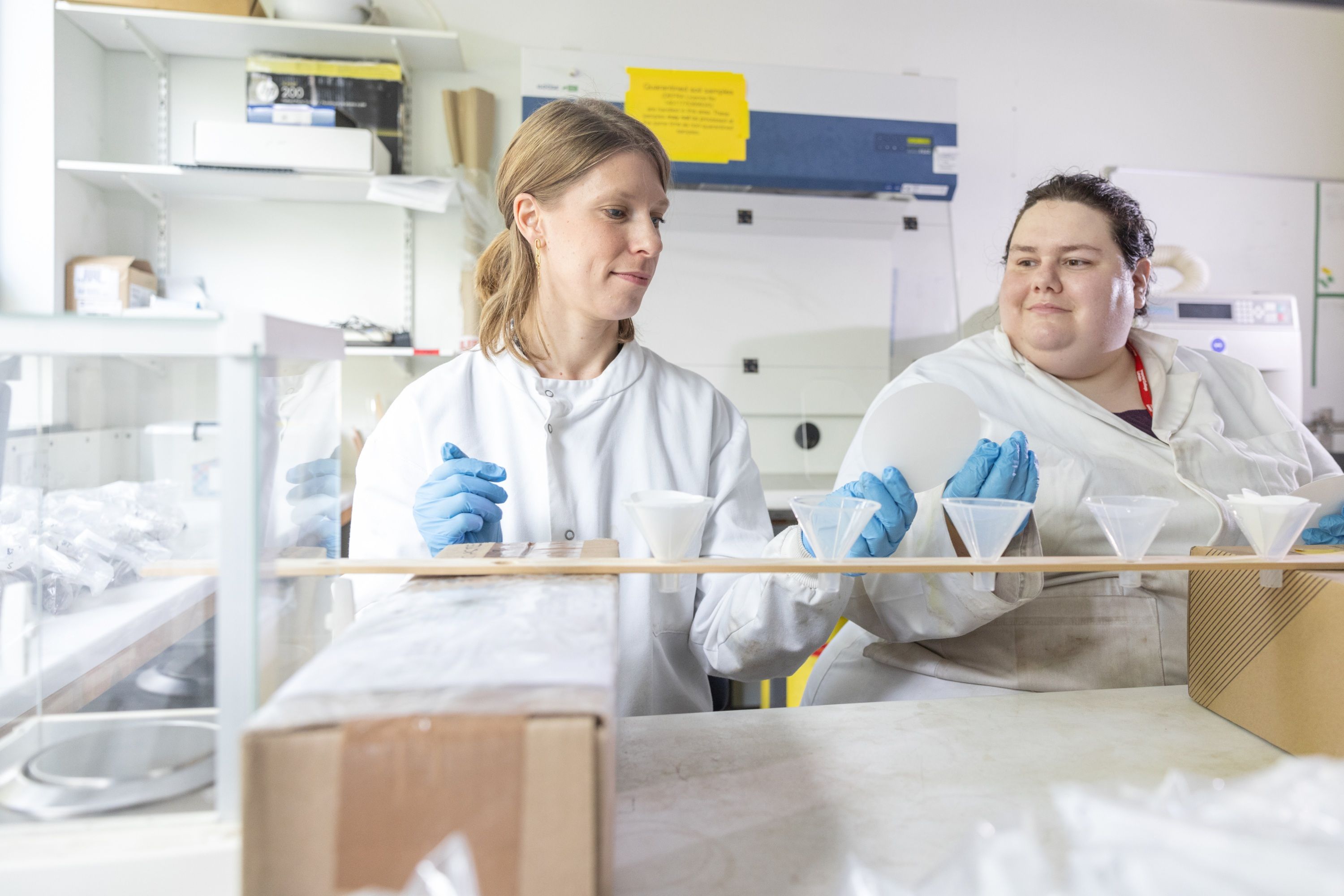
Living Planet with Ecological Applications
Receive theoretical and hands-on training in the application of ecological and evolutionary science.
Receive theoretical and hands-on training in the application of ecological and evolutionary science
Develop your expertise alongside external partners and leading researchers in the field
Apply your research skills to real world problems on an extended project
Course key facts
-
Qualification
-
MSc
-
-
Duration
1 year
-
Start date
September 2025
-
Study mode
Full-time
-
Fees
£15,800 Home
£34,250 Overseas
-
Delivered by
-
Location
-
Silwood Park
-
Course overview
Receive broad training in the application of ecological and evolutionary theory on this Master's course.
You'll acquire the practical, quantitative and analytical skills required for a successful career in ecological research and apply your skills to real-world problems.
Taught in partnership with leading organisations, which may include CABI, Surrey Wildlife Trust, and Syngenta, this course will enable you to forge close links to industry and nongovernmental organisations.
Through this work, you’ll develop the expertise required for further study at PhD level or for a career in applied ecology and conservation.
At the beginning of the course you will have the option to choose between focusing on developing your computational or field skills. You’ll carry out two group projects with external partners before applying your knowledge to an individual research project.
You'll also evaluate the ecological principles of population and environmental management and control, and consider the social and economic dimensions of related policy.
MSc Living Planet programme
Our MSc Living Planet course will equip you to tackle the great environmental challenges facing the world, providing training on the transferrable research skills you’ll need to develop science-based understanding and interventions. All our MSc Living Planet streams are available in full-time or part-time modes.
You may wish to consider if another stream is right for you according to your career aims and background:
- MSc Living Planet with Ecological Applications (this stream)
- MSc Living Planet with Computational Methods in Ecology and Evolution
- MSc Living Planet with Ecology, Evolution and Conservation
- MSc Taxonomy, Biodiversity and Evolution
MRes Living Planet course
We also offer an MRes in Living Planet course with the following streams:
Structure
This page is updated regularly to reflect the latest version of the curriculum. However, this information is subject to change.
Find out more about potential course changes.
Please note: it may not always be possible to take specific combinations of modules due to timetabling conflicts. For confirmation, please check with the relevant department.
You'll complete all the following core modules.
- Statistics in R
- Introduction to Ecological and Evolutionary Data Science
- Environmental Microbiology
- Agroecosystems
- Managing Carbon
You'll choose one of the following optional modules.
- Silwood Field Course and Basic Computing
- Biological Computing Bootcamp
You'll complete a scientific research project, culminating in a written and oral report suitable for potential publication in your chosen area of specialisation.
This project typically lasts five months and can include external placements.
Teaching and assessment
Balance of teaching and learning
Key
- Lectures and practicals
- Independent study
- Individual research project
- 20% Lectures and practicals
- 30% Independent study
- 50% Individual research project
Teaching and learning methods
-
Lectures
-
Tutorials
-
Seminars and formal presentations
-
Practical classes
-
Field work
-
Workshops
-
Case studies
-
Group work
-
Computer-based work
-
Virtual learning environment
-
Lecture recordings
-
Taxonomy e-diary exercise
-
Individual research project
-
Independent study
Assessment methods
-
Coursework
-
Examinations
-
Research project
Entry requirements
We consider all applicants on an individual basis, welcoming students from all over the world.
How to apply
Apply online
You can submit one application form per year of entry. You can choose up to two courses.
Application deadlines – Round 1 closes on Thursday 16 January 2025
We operate a staged admissions process with several application rounds throughout the year.
Apply by 23.59 (UK time) on the closing date of an application round, to ensure you receive a response on your application by the relevant decision date.
Application rounds
Round 1
- Apply by Thursday 16 January 2025
- Decision by Thursday 6 March 2025
Round 2
- Apply by Thursday 27 March 2025
- Decision by Thursday 1 May 2025
Round 3
- Apply by Thursday 15 May 2025
- Decision by Thursday 17 July 2025
If you are applying for a taught Master’s course, you will need to pay an application fee before submitting your application.
The fee applies per application and not per course:
- £80 for all taught Master's applications excluding those to the Imperial College Business School
- £100 for all MSc applications to the Imperial College Business School
- £150 for MBA applications to the Imperial College Business School
There is no application fee for MRes courses, Postgraduate Certificates, Postgraduate Diplomas or research courses, such as PhDs and EngDs.
If you are facing financial hardship and are unable to pay the application fee, we encourage you to apply for our application fee waiver.
Find out more about how to apply for a Master's course, including references and personal statements.
When are applicants invited for an interview?
Applicants will be invited for an interview should their written application pass an initial review.
How long is the interview and what purpose does it serve?
This interview lasts about 10-20 minutes. It serves as an opportunity for a two-way conversation between the interviewer and the applicant to ask questions and probe further. There are several elements that are being explored, including the applicant's motivations, academic ambitions and their suitability for our courses.
When does it take place?
Interviews will usually be scheduled approximately 3-4 weeks after the application round deadline that you applied to, and we aim to inform applicants of the confirmed schedule approximately 1 week in advance.
How is the interview going to be conducted?
Regardless of whether you are in the UK or overseas, the interview will be conducted through an online meeting via Microsoft Teams.
An ATAS certificate is not required for students applying for this course.
Tuition fees
Home fee
2025 entry
£15,800
You should expect and budget for your fees to increase each year.
Your fee is based on the year you enter the university, not your year of study. This means that if you repeat a year or resume your studies after an interruption, your fees will only increase by the amount linked to inflation.
Find out more about our tuition fees payment terms, including how inflationary increases are applied to your tuition fees in subsequent years of study.
Whether you pay the Home or Overseas fee depends on your fee status. This is assessed based on UK Government legislation and includes things like where you live and your nationality or residency status. Find out how we assess your fee status.
If you're a UK national, or EU national with settled or pre-settled status under the EU Settlement Scheme, you may be able to apply for a Postgraduate Master’s Loan from the UK government, if you meet certain criteria.
For courses starting on or after 1 August 2024, the maximum amount is £12,471. The loan is not means-tested and you can choose whether to put it towards your tuition fees or living costs.
The loan is not means-tested and you can choose whether to put it towards your tuition fees or living costs.
Overseas fee
2025 entry
£34,250
You should expect and budget for your fees to increase each year.
Your fee is based on the year you enter the university, not your year of study. This means that if you repeat a year or resume your studies after an interruption, your fees will only increase by the amount linked to inflation.
Find out more about our tuition fees payment terms, including how inflationary increases are applied to your tuition fees in subsequent years of study.
Whether you pay the Home or Overseas fee depends on your fee status. This is assessed based on UK Government legislation and includes things like where you live and your nationality or residency status. Find out how we assess your fee status.
If you're a UK national, or EU national with settled or pre-settled status under the EU Settlement Scheme, you may be able to apply for a Postgraduate Master’s Loan from the UK government, if you meet certain criteria.
For courses starting on or after 1 August 2024, the maximum amount is £12,471. The loan is not means-tested and you can choose whether to put it towards your tuition fees or living costs.
The loan is not means-tested and you can choose whether to put it towards your tuition fees or living costs.
How will studying at Imperial help my career?
Learn the techniques you need to succeed in a career in ecology and conservation.
Data retrieval, experimental design and statistics, modelling, and field and laboratory data collection are all included.
Several leading wildlife organisations partner with the programme.
Your close links to industry and non-governmental organisations will enable you to further your career goals as an applied ecologist or conservationist.
Further links
Contact the department
Email: pgt.silwood@imperial.ac.uk
Course Director: Professor Peter Graystock
Visit the Department of Life Sciences website.

Request info
Find out more about studying at Imperial. Receive updates about life in our community, including event invites and download our latest Study guide.

Events, tasters and talks
Meet us and find out more about studying at Imperial.

Terms and conditions
There are some important pieces of information you should be aware of when applying to Imperial. These include key information about your tuition fees, funding, visas, accommodation and more.
You can find further information about your course, including degree classifications, regulations, progression and awards in the programme specification for your course.
Programme specifications